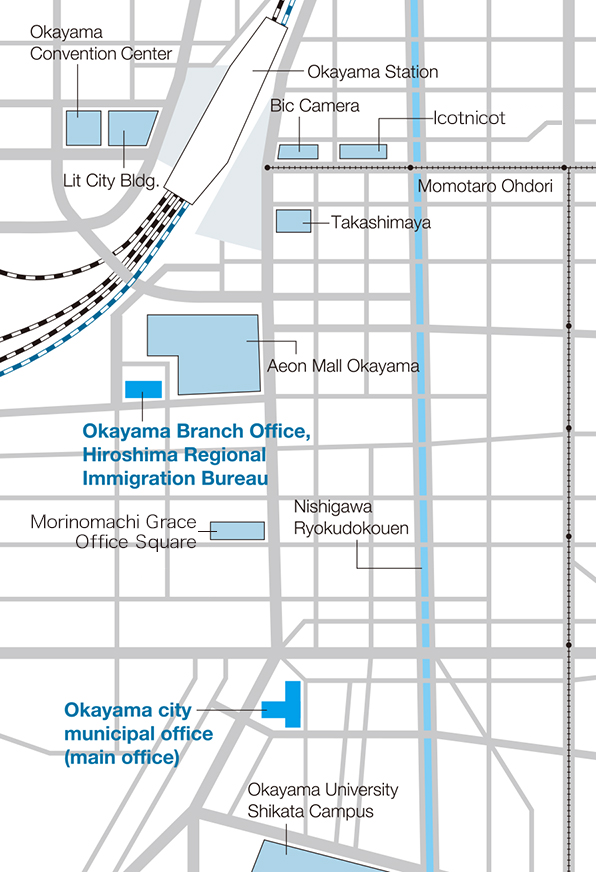International students
1 Procedure for Residency Status
Residence Card
The Immigration Bureau issues a Residence Card to all foreigners who plan to stay in Japan for three months or longer. If entering Japan via Narita Airport, Haneda Airport, Chubu Airport, Kansai Airport, Hiroshima Airport, Fukuoka Airport or New Chitose Airport, your passport will receive a Landing Permission stamp, and a residence card will be issued.
For those entering via any other airport (including Okayama Airport) in Japan, Landing Permission will be stamped in your passport along with a note stating 'A Residence Card will be issued at a later date.' In this case, the Residence Card will be issued to you after you have reported your local Japanese address to the local municipal government office. As a general rule, the Residence Card will be mailed to this address from the Regional Immigration Office.
Obligation to Carry the Residence Card
The Residence Card must be carried at all times. You must produce this card upon request by a police officer or other government officer. Failure to do so may result in a fine and/or imprisonment.
Change of Address: Procedure at the local municipal government offices
All information shown on your Residence Card must be current. If you are moving to another city / town, you are required to report your move to your prior local municipal government office with jurisdiction over the address you resided at before moving. When you relocate, your new address must be reported, and your Residence Card submitted to the local government office of your new residence, no later than 14 days from the date of relocation. When this procedure is completed, your new address will be shown on the back of your Residence Card.
Changes in Information on the Residence Card (other than change of address) or Loss / Damage of the Residence Card: Procedures at your local Regional Immigration Bureau
Residence Card changes (other than change of address) such as name, date of birth, gender, nationality, or region, must be reported and your Residence Card submitted to the local regional immigration office no later than 14 days from the date on which the change took place. When the procedure is completed, your Residence Card will be re-issued.
If you lose your Residence Card or if it is damaged, you must report this situation to the regional immigration office as soon as possible.
[Sample Residence Card]
Front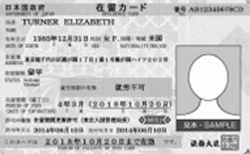
Back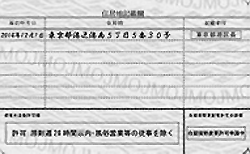
Notification of Place of Residence
Within 14 days of arrival in Japan, you are required to register your residential address at your local Municipal Government Office. If you fail to report your place of residence, for no justifiable reason, your Status of Residence may be canceled.
Those who receive a Residence Card at the Airport
Those who have received a Residence Card at the airport must go to their local Municipal Government Office with their Residence Card and register their residential address. The local government office will note this address on your Residence Card.
Those who do not receive a Residence Card at the Airport
After completing notification of place of residence at your local municipality, a Residence Card will be mailed to your address in Japan about 2 weeks after completing this procedure. Until the Residence Card is issued, a ‘Copy Certificate of Residence can be used to prove your status.
Those who have moved to Okayama City from Other Cities in Japan
When you report your move away from your former municipality, the office will issue you with a ‘Moving Out Certificate’. You must bring the ‘Moving Out Certificate’ to your new municipal government office in Okayama City and report your new residence within 14 days of moving into your new residence.
Extension of Residency Period
Staying in Japan beyond the authorized residency period is illegal and may lead to deportation or criminal penalties. You must report to the local regional immigration bureau (or its branch office) 3 months in advance of the expiration of your period of residence and apply for an extension of your stay in Japan. Please note that the Application Form for 'Extension of Period of Stay' has sections that must be filled in by International Affairs Department. Persons seeking an extension of stay should apply in advance to the International Affairs Department. If the extension of stay is approved by the Immigration Bureau, you must report this approval to International Affairs Department.
Required Documents
- Application Form for Extension of Period of Stay (official form from the Ministry of Justice) (The application form is available at International Affairs Department.)
- Passport
- Copy of your Residence Card (both sides)
- One photo (4 cm × 3 cm)
- Fee payment form (with a ¥4000 revenue stamp attached)
- Certificate of university enrollment (issued within the last 3 months)
- Certificate of academic transcripts (issued within the last 3 months)
- Document certifying financial ability to cover all expenses during residence in Japan
*If covered by the applicant: Savings deposit passbook, etc., and other documents that certify outstanding balance in the account
*In case of overseas money transfer: Document, etc., certifying that foreign currency has been exchanged into Japanese yen
*In case of coverage by a person supporting expenses in Japan: Certificate of employment of the person providing financial support and other documents certifying income and documents identifying the relationship with the applicant
- Certificate of scholarship
- Certificate of part-time employment issued by the employer
- Certificate of exemption from tuition payment
- Copy of National Health Insurance Certificate
Change in Residency Status
An 'International Student' refers to a person whose residency status is recognised as a 'Student' in Japan. Students having a residency status such as 'Dependent (of a family residing in Japan),' or 'Spouse or Child of Japanese National’, 'Spouse or Child of Permanent Resident,' are not regarded as having 'International Student’ status.
Those receiving scholarship grants, or attending tutoring programs, for example, specifically for international students, must apply for 'International Student' residency status. Students who have entered Japan on a residency status other than 'Student' should make an offer to the International Affairs Department after admission to the university.
Temporary Departure from Japan and Special Re-entry Permit Program
If you are going to leave Japan temporarily to return to your home country or for research purposes with the intention of ultimately returning to Japan, the following steps must be taken before departure.
- Obtain permission from your Academic Advisor.
- Submit the form for temporary leave to your Faculty or Graduate School.
- If you live in a dormitory, you need to inform the manager of your dormitory.
Special Re-entry Permit System
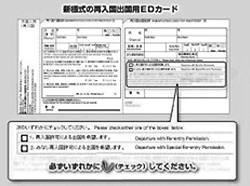
Foreign nationals in possession of a valid passport and Resident Card who will be re-entering Japan within 1 year of their departure, to continue their activities in Japan will, in principle, not be required to apply for a re-entry permit. (This is called the ‘Special Re-entry Permit System’.) When you leave Japan, be sure to present your Residence Card and check the column indicating your intention to depart by the Special Re-entry Permit System on an Embarkation / Disembarkation (ED) Card for a Special Re-entry Permit. There are no fees involved in this procedure.
Foreign nationals who have departed from Japan on a special re-entry permit will not be able to extend the year abroad permitted while overseas. Please note that foreign nationals will lose their resident status if they fail to re-enter Japan within 1 year of their departure or before the expiration of the current Residence Card. If there is a possibility that you may not be able to re-enter Japan within 1 year, you need to obtain a 'Re-entry Permit' at the Regional Immigration Office in advance of your departure from Japan.
Engaging in activities outside the scope permitted (permission for part-time work)
An international student residing in Japan as a 'College Student' is not permitted to work. However, a part-time job is possible with permission, only if the work does not interfere with your studies and the purpose of the work is to cover academic or living expenses in Japan. If you want to work part-time, you have to apply for permission at one of these facilities: ① at the airport when you enter Japan, or after arriving in Okayama, ② go to the Okayama Branch Office of Hiroshima Immigration Bureau.
Although International Affairs Department will give advice and information, you must apply on your own.
Exclusive guideline is available for MEXT scholarship students. Please consult with the International Affairs Department before applying for 'Engaging in activities other than those Permitted under the Status of Residence Previously Granted'.
** Application for 'Engaging in activities other than those Permitted under the Status of Residence Previously Granted' is available at the port of entry for those who satisfy the following criteria:
- A person entering Japan for the first time (excluding those who enter using a re-entry permit)
- A person for whom 'Student' residence status has been established and their Residence Card has been issued.
※Please note that working part-time without permission, exceeding the number of working hours permitted in a week, and / or working at a prohibited type of business may lead to criminal punishment or deportation.
Please follow the following rules when working part-time: - The number of working hours may not exceed 28 hours per week. However, working hours during spring, summer and winter breaks, designated by the University, should be no more than 8 hours per day. (*The limit in working hours does not apply to Teaching Assistants (TAs), Research Assistants (RAs), and other activities involved in educational and research assistance.)
- Work at an adult entertainment business or related businesses such as bars, pubs, pachinko parlors, etc., is prohibited.
※When you have a part time position related to activities assisting education, such as a TA or an RA, based on a contract with a university, permission for such activities is not required. Please note that all types of part-time work, excluding the aforementioned, require permission before starting the job.
Required Documents
- Filled in Application for 'Engaging in activities other than that Permitted under the Status of Residence Previously Granted’
- Passport
- Residence Card (or Alien Registration Certificate)
Tax Convention (Income tax exemption for international students’ income from part-time jobs.)
Some countries have tax treaties with Japan and offer regulations for tax exemption for international student income from part-time jobs. International students, working part time, in these countries shall be exempted from income tax, if the income is within the conditions for tax exemption.
When you have a part-time job, income tax will be automatically deducted from your salary. However, you may apply for exemption from income tax by submitting the appropriate documents in accordance with the income tax law.
Important notes if you have a leave of absence from school
- Return to your home country once leave of absence is granted!
If an international student leaves the university for more than three months for a leave of absence and stays in Japan, their ‘Student,’ status will be revoked. In the worst-case scenario, deportation procedures may be implemented. - Do not work part time in Japan!
When you have a leave of absence from the university, you cannot work (part time or full time). 'Activities other than those permitted' status is not authorized during leave of absence from school.
Important notes after graduation
Even if the student's period of stay remains valid, a student loses their 'Student' residence status after graduation, completion of a course of study, or withdrawal from the University and is not authorized to remain in Japan. If the student plans to remain in Japan for job-hunting activities, remaining in Japan without changing residence status will lead to 'Cancellation of Residence Status.'
Resident status after graduation ('Specific Activities' visa)
When international students, who are enrolled in Okayama University as regular students, want to continue seeking employment in Japan after graduation, the status of residence must be changed from 'Student' to 'Designated Activities (6 month period)’. The period of stay may be renewed only once for a maximum total period, including the one extension, of 1 year. To obtain a change to this status, a letter of recommendation from the University is required when applying.
Job-hunting activities cannot be continued using a 'Student' visa after graduation from the University.
Required Documents
- Application form for Change of Status of Residence
- One photo (4 cm ×3 cm)
- Passport
- Residence Card (or Alien Registration Certificate)
- Documents certifying financial ability to cover living expenses (photocopy of bank passbook, certificate of outstanding balance in bank account, etc.)
- Certificate of graduation from the University to which the person was enrolled most recently
- Letter of recommendation issued by the University to which the person was enrolled until most recently for continued job-hunting activities
- Evidence materials that substantiate that the person is engaged in continued job-hunting activities
Issuing a Letter of Recommendation
The letter of recommendation is issued at the International Affairs Department.
* As a general rule, a letter of recommendation cannot be issued after graduation.
Please apply for the Letter of Recommendation at the International Affairs Department by submitting the following documents:
- Application for Letter of Recommendation (for the 'Designated 'Activities' visa required for job-hunting.) Note: The signature and seal (inkan) of your academic advisor is required on the application. Copies of this application are available at the International Affairs Department.
- Documents certifying financial ability to cover expenses (photocopy of bank passbook, certificate of outstanding balance in bank account, etc.)
- Certificate of Expected Course Completion or Certificate of Expected Graduation.
- Reference materials that substantiate that the person is engaged in continued job-hunting activities.
Important notes
- Documents that certify that the student is engaged in continued job-hunting activities are, for example, record of career counseling at Okayama University Career Support Office, Japanese job placement office 'Hello Work', record of visits to various business enterprises. Attending job fair and seminar is not accepted as job hunting. Moreover, job-hunting activities targeted to business enterprises that are remotely related to the academic pursuits, academic department and acquired qualifications of the international student will not be recognized as job-hunting activities, due to the very low possibility of a work visa being issued.
- Please submit a 'Job-hunting Activity Status Report' to International Affairs Department once a month without fail in the first 6 months of the issuance of a 'Specific Activities' Visa. If this report is not regularly submitted, the Letter of Recommendation necessary for the 6 month extension of this visa status will not be issued by Okayama University.
- Please notify International Affairs Department in case of any change in address, when you decide to leave Japan, or when your employment is determined.
2 Student Life
Tutor System
This is a system in which Okayama University students act as tutors to provide advice and support to international students (residential status: Student) in their studies and daily lives. Eligible students are, in principle, undergraduate, graduate, and research students who have newly arrived in Japan from abroad and whose academic advisor recognizes the need for individual guidance by a tutor. The period covered is the first six months after enrolling in the university. For further details,please contact the International Affairs Department.
Japanese Language Education
Institute for Promotion of Education and Campus Life
- Classes
The Center for Language Education provides Japanese language classes for international students enrolled atin the Okayama Uuniversity. The Japanese language course offers seven levels of classes. For more information, please refer to the following URL:
https://www.ipec.okayama-u.ac.jp/language/japanese/page_628/ - Nihongo Cafe (にほんごカフェ)Sakura
The Nihongo Cafe Sakura is a place where international students and Japanese students communicate using Japanese as the common language. All Okayama University students and staff are welcome. For more information, please refer to the following URL:
https://www.ipec.okayama-u.ac.jp/language/?p=1873
Okayama University International Alumni Association (OUIAA)
Every International Student of Okayama University is qualified to be a member of the Okayama University International Alumni Association(OUIAA). You are welcome to attend the OUIAA General Assembly, which is held every year, and the related events. After your graduation or the completion of your coursework, please register yourself to your regional branch and participate in their activities. For more details, contact the OUIAA Office.
E-mail:ouiaa@adm.okayama-u.ac.jp
URL:http://alumni.ouic.okayama-u.ac.jp/en/index.html
3 Scholarships
There are various scholarship programs for privately-financed international students, providing financial stability while pursuing studies at Okayama University. International Affairs Department collects details of program applications from relevant undergraduate and graduate schools at the University and posts them on its noticeboard and Institute of Global Human Resource Development website.
https://intl.okayama-u.ac.jp/en/support/scholarships/
Applicant Eligibility (excluding Japanese Government (Monbukagakusho: MEXT) scholarships)
Applicant should meet all of the conditions below at the time of application.
- Academic ability satisfies the level of the Monbukagakusho Honors Scholarship for Privately-Financed International Students.
Undergraduates and graduate students: 2.3 and above
For grades from Okayama University: ((A+ and A credits x 3) + (B credits x 2) + (C credits x 1) + (F credits x 0)) / number of registered credits - Applicant should not have repeated a year due to poor academic performance.
- The average monthly remittance to the applicant must be 90,000 yen or less. (Admission fees, tuition fees, etc. are not included)
- The annual income of the financial supporter should be less than \5,000,000.
- Applicant is not a recipient of the Japanese Government (Monbukagakusho: MEXT) scholarship or Interexchange Association Japan (IAJ), nor a sponsored student of a foreign government.
- Applicant must not be a recipient of any other scholarship (including those in the application process) that is not allowed to be concurrently awarded.
- Applicant who needs financial support to study.
- Applicant who has never been disciplined by Okayama University.
- Applicant should meet any other requirements specified by the sponsor.
Application Procedure
To apply for scholarships that require a recommendation from the university, please apply through the Okayama University moodle. For more information, please check the Institute of Global Human Resource Development website.
Scholarship Selection Criteria
Scholarship programs involving applications through the University, establish a ranking system in accordance with the University's scholarships screening guidelines. The number of students to be recommended are chosen from the top and then in descending order.
Ranking is based on the following criteria: (1) academic performance; (2) course year; (3) personal character (whether there had been immigration law violation or school rule violation in the past) and (4) finacial difficulty (whether the student or his/her spouse has received a scholarship the previous academic year or not).
# A "spouse" is defined as a person with whom the student has de facto marital relationships (such as living in the same residence), even without legal marital status.
Important Notes When Applying for Scholarships
- If an application is submitted to one scholarship program, the applicant is NOT allowed to apply for another scholarship program. Please select the scholarship program carefully, based on information. Major Scholarship Programs’ below.(However,if concurrent scholarship payments are allowed under both/all scholarship`s regulation you can apply.)
- If any false information is found in the documents submitted, the scholarship will be cancelled immediately, and any grant funds already received must be returned.
- If an applicant is chosen to receive a scholarship through a "private application", without University mediation, you must report the receipt of this award / scholarship to International Affairs Department.
Major Scholarship Programs
- JASSO Honors Scholarship for Privately-Financed Students (known as "Gakushu-Shoreihi")
This scholarship grant is provided to a student of outstanding academic performance and character, who finds studying at university difficult due to financial reasons. A monthly stipend of \48,000 is paid to the student in an undergraduate or graduate program. The application acceptance period is irregular, so please check the Institute of Global Human Resource Development website. - Scholarship from Other Private Scholarship Foundations
Various private scholarship organizations accept applications for scholarships through each university for privately financed international students who are currently enrolled at the university. However, the number of students that can be recommended by the university is limited, and in most cases, especially for research students (non-regular students), they are not eligible to apply for scholarships. In addition, all scholarships are very competitive because the number of applicants is high relative to the number of positions available. Therefore, even if you apply, you may not always be recommended by the university to the scholarship organization, and even if you are recommended by the university, you may not always be selected. Students who wish to apply for scholarships should check the bulletin boards of each faculty and graduate school and the International Affairs Department, and the Institute of Global Human Resource Development website, and apply for scholarships with careful selection.
# Please note that information on scholarship application periods, monthly stipends, etc., are those of the previous academic year and may not be applicable.
4 Medical Care, Insurance and Japanese National Pension
National Health Insurance
Foreign residents who have been granted a visa, valid for more than 3 months, are required to enroll in the National Health Insurance regardless of their visa status (except those who have a short-term or diplomat visa). All foreign nationals who stay in Japan for mid to long term range are required to join the National Health Insurance system even if they already have insurance in their own home country. Applications are accepted at the municipal office of the city (town, village) where the resident lives in Japan. By paying this insurance premium, insurance will cover about 70% of medical charges, including hospitalization and the student will only pay approximately 30% of the medical expenses. This insurance also covers dental treatment.
National Health Insurance Card (Hokensho)
After signing up for National Health Insurance, you will receive an insurance card by registered mail. Please keep it in a safe place. In addition, please remember to take your National Health Insurance Card with you when you visit the hospital and show this at the reception desk. However, this insurance does not cover general health checks, preventative injections, cosmetic surgery, orthodontics, pregnancy and childbirth. Since this card is available all over Japan, please take the insurance card with you when you travel within the country.
Premium Payment of Insurance
After signing up for National Health Insurance, an insurance premiums payment booklet will be sent by post at a later date (it may arrive up to 2 months later depending on the timing of procedures at the municipal office). You must pay the insurance premiums through a bank or convenience store. Residents should ask the city (town, village) office about the amount of the premium for National Health Insurance because it is based on the annual income of the insured person. In many cases, international students, whose income in Japan is low, will receive a reduction in the monthly premium after completing the appropriate application procedures.
Other Important Items of Note
Please note that if you avoid joining the National Health Insurance, you will face enormous costs (100% of medical cost) if you require medical treatment. Be sure to take the card with you when you see a doctor.
In case you change your residential address, name or head of household, please notify this change to the city office where the National Insurance Card was issued within 14 days. Please bring the insurance card with you at that time.
If you have any questions, please contact the following section directly.
Okayama City Kita Wardo Office Citizens National Health Insurance and Pension Division
| Phone | 086-803-1118 |
|---|---|
| Fax | 086-803-1749 |
| Address | 1-1-1 Daiku Kita-ku Okayama-shi Okayama 700-8544 |
| Open | 8:30-17:15 (Monday-Friday) |
| Closed | Weekends, holidays and year-end New Year holiday |
National Health Insurance Card (example)
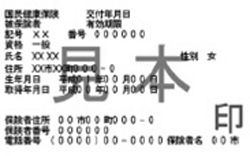
Japanese National Pension
Enrolling in the National Pension plan
All people that reside in Japan and are 20 years of age or older (including international students) are required to enroll in the national pension plan. Contribution payment (fee) is 16,520 yen/month as of fiscal 2023.
Once enrolled in the national pension plan, you will receive a basic pension number notification and a national pension insurance premium payment slip about one month later.
Exemption of the Contributions
You may be exempt from contribution payments if you are a student and or income is low, and if your application for exemption is granted.
You can apply for the exemption of the Contributions at the same time of enrolling in the national pension plan.
Social Security and Tax Number System
Social Security and Tax Number System started in October, 2015.Municipalities will issue a single 12-digit Individual Number named “My Number” to each and every person who holds a resident record in their city. The Number will be used for administrative procedures related to social security, taxation, and disaster response.
You will receive the number by registered mail later.Use of Individual Numbers for any purpose that is not stipulated by law and providing numbers to others are prohibited. The number will serve you for your life time, please take proper steps to protect it.
For details, refer to the following website;
https://www.kojinbango-card.go.jp/en/
5 Student Housing
International Student Dormitories
Okayama University has four dormitories for international students. They can live in these facilities for up to six months from the date of their entrance to the university. Those who fall under the category of ‘Priority Student’ will be given preference. Residents are not permitted to change a dormitory or a room after moving into a specific dorm.
※Okayama University is a completely non-smoking environment. Dormitories are also non-smoking in all locations including public spaces, shared areas and private rooms. Only 1 person is permitted per room. If your spouse lives in Okayama Prefecture, you cannot live in a dormitory. In this case, please contact International Affairs Department as soon as possible. Please note that it is forbidden to have anyone stay overnight in the dormitory.Violaters will be evicted.
For more details, pictures and maps please refer to the housing web page:
https://intl.okayama-u.ac.jp/support/housing/dormitory/
※International Students excluding Priority Students
Where there are more applicants than available rooms, residency is decided on a lottery basis.
Kuwanoki Dormitory for International Students
Monthly rent (North Wing): ¥16,000 (South Wing): ¥14,000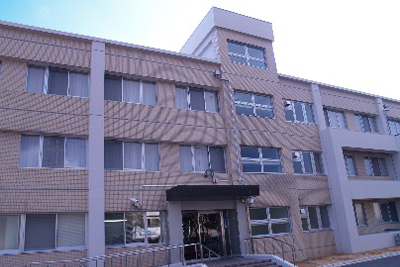
Fukui Dormitory for International Students
Monthly rent: ¥28,000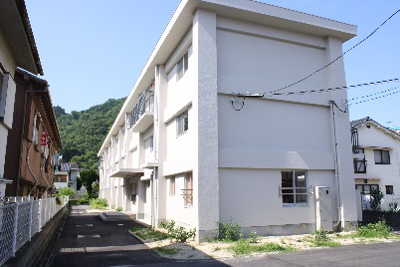
International House for International students and Researchers
Monthly rent: ¥27,000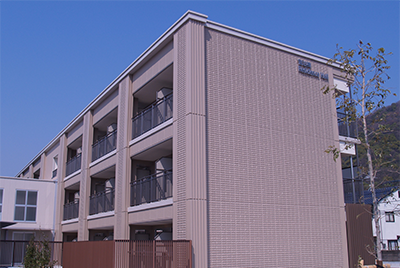
International Student Shared House
Monthly rent: ¥23,000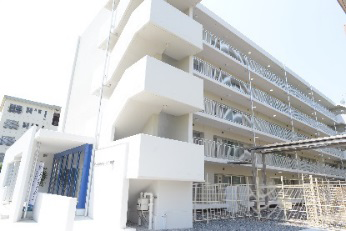
* Admission fee for each dormitory: ¥30,000
* Television license and internet included in the rental charge.
* In addition to the rent,utility fees (fixed price per month) will be charged.
* All Dormitory rents are subject to change.
Private Apartments
To rent a private apartment, visit the University Cooperative CO-OP (1st floor of the Peach Union building) .
Rents for apartments near the University differ by building age, location, environment, room size, and available facilities. On average, the rent is in the 30,000 to 50,000 yen range.
Please note that renting an apartment or other private housing in Japan may require a deposit, key money, real estate agent brokerage and other expenses, as well as a guarantor. If it is necessary to have a guarantor for a new lease contract, students are required to use a private guarantor company specified by the real estate agencies, etc.
Rent / Apartment Size Examples
| Room type | Apartment/Studio |
|---|---|
| 4.5-mat size (approx. 7.4 ㎡) | ¥30,000~¥40,000 |
| 6-mat size (approx. 9.9 ㎡) | ¥38,000~¥50,000 |
| Remarks | Private kitchen, bathroom and toilet |
Rent-Related Costs
| Fee Name | Amount Required | Description |
|---|---|---|
| Deposit | 1 to 3 months rental fee | A deposit paid to the owner/landlord when the contract is signed for unpaid rent, and/or damages and repairs necessary upon vacancy. Returned to the tenant, minus fees. |
| Key Money(Reikin) | 1 to 2 months rental fee | Fee paid to owner/landlord on signing contract. 1-2 months' rent. Non-refundable |
| Agent Fee | 1 month Rental fee | Commission fee paid to the intermediary real estate agent. |
6 Advice Services for International Students
Staff Responsible for International Students
Okayama University has an office specifically to take care of international students in International Affairs Department and at every faculty and graduate school. If an international student has any questions in their academic or daily life, please feel free to go to that section of the faculty, graduate school, or International Affairs Department for consultation.
| Faculty/Graduate School | Section in Charge | Telephone No./E-mail |
|---|---|---|
| School of Letters | School of Letters Student Affairs office, Graduate School of Humanities and Social Sciences | 086-251-7370 ggg7363@adm.okayama-u.ac.jp |
| School of Education | Teacher and Student Support Office | 086-251-7588 hgg7598@adm.okayama-u.ac.jp |
| Faculty of Law | Faculty of Law Student Affairs Office, Graduate School of Humanities and Social Sciences | 086-251-7364 ggg7363@adm.okayama-u.ac.jp |
| School of Economics | School of Economics, Student Affairs Office, Graduate School of Humanities and Social Sciences | 086-251-7365 ggg7363@adm.okayama-u.ac.jp |
| School of Science★ | Administration Office for School of Science, Instruction and Student Section | 086-251-7778 igx7778@adm.okayama-u.ac.jp |
| Medical School | Instruction and Student Section (Faculty of Medicine), Graduate School of Medicine, Dentistry & Pharmaceutical Sciences. Instruction and Student Section (Faculty of Health Sciences), Graduate School of Medicine, Dentistry & Pharmaceutical Sciences |
086-235-7022 kdd7020@adm.okayama-u.ac.jp 086-235-7984 |
| Dental School | Instruction and Student Section (Dental School), Graduate School of Medicine, Dentistry & Pharmaceutical Sciences | 086-235-6628 mag6627@adm.okayama-u.ac.jp |
| Graduate School of Health Sciences | Instruction and Student Section (Faculty of Health Sciences), Graduate School of Medicine, Dentistry & Pharmaceutical Sciences | 086-235-7984 |
| Graduate School of Medicine, Dentistry & Pharmaceutical Sciences | Graduate Office (Medicine)Graduate School of Medicine, Dentistry & Pharmaceutical Sciences Instruction and Student Section (Dental School), Graduate School of Medicine, Dentistry & Pharmaceutical Sciences Instruction and Student Section (Pharmaceutical Sciences) School of Pharmaceutical Sciences School |
086-235-7987 kdf7986@adm.okayama-u.ac.jp 086-235-6628 mag6627@adm.okayama-u.ac.jp 086-251-7923 ngg7923@adm.okayama-u.ac.jp |
| School of Pharmaceutical Sciences | Administrative Office for Pharmaceutical Sciences,Instruction and Student Section | 086-251-7923 ngg7923@adm.okayama-u.ac.jp |
| School of Engineering | Graduate School of Natural Sciences, School of Engineering, Academic Affairs and Student Office | 086-251-8018 ogg8018@adm.okayama-u.ac.jp |
| School of Environmental Science & Technology★ | Graduate School of Natural Sciences, School of Engineering, Academic Affairs and Student Office | 086-251-8018 ogg8018@adm.okayama-u.ac.jp |
| School of Agriculture★ | Administration Office for School of Agriculture, Instruction and Student Section | 086-251-8286 qgg8286@adm.okayama-u.ac.jp |
| Graduate School of Humanities and Social Sciences | Graduate School Section, Graduate School of Humanities and Social Sciences | 086-251-7362 ggg7372@adm.okayama-u.ac.jp |
| Graduate School of Environmental, Life, Natural Science and Technology(Master's Course(Engineering), Doctor's Course) | Graduate School Section, Graduate School of Natural Science & Technology | 086-251-8575 agf8576@adm.okayama-u.ac.jp |
| Graduate School of Natural Science & Technology (Doctor’s Course), (5 years Ph.D. Course) | ||
| Graduate School of Environmental and Life Science (Doctor’s Course) | ||
| Graduate School of Natural Science & Technology (Master’s Course, Engineering) | ||
| Graduate School of Interdisciplinary Science and Engineering in Health Systems | 086-251-7771 agf8576@adm.okayama-u.ac.jp |
|
| Discovery Program for Global Learners | Office for Global Discovery Program | 086-251-7915 kyomu_discovery@adm.okayama-u.ac.jp |
| International Affairs Department | 086-251-7051 international@adm.okayama-u.ac.jp |
★Including Master’s Course Students
International Student Advising Section
Advisors in the International Student Advising Section respond to the troubles and fears from international students. The advice given here covers learning and study, scholarship and tuition, on and off campus housing, entry and residing formalities, student family matters, and other student life-related issues. All faculty and graduate school students are welcome. Feel free to contact international Student Advising Room, if you have any questions and concerns about student life at Okayama University.
| Advisors | Sex |
|---|---|
| Prof. Mariko Uzuka | Female |
| Campus | Location | Office Hours and Email |
|---|---|---|
| Tsushima Campus | Next room of the International Affairs Department, First floor of the Genetral Education Building C |
Monday& Friday 2:00pm-5:00pm Tuesday,Wednesday,Thursday 10:00am~1:00pm, 2:00pm~5:00pm Required an appointment by Email or Facebook. Email advising02@okayama-u.ac.jp Facebook @ISAR.okayama(Search) |
Advising sessions on Shikata campus are available. For further information, send a message to: advising02@okayama-u.ac.jp.
7 Returning to Your Home Country
When Your Departure Date from Japan has Been Determined
There are various administrative procedures that must be completed before your departure from Japan. Some procedures must be done at the University, some related to everyday living and those required on the date of your departure. Check the items below to start preparations and to be sure not to forget anything.
Example of Exiting Procedures at the University
- Notify your academic advisor of your date of departure.
- Check with International Affairs Department and your academic department for the correct exiting procedures.
- Request an issue of your transcript, certificate of completion, or any other academic documents well in advance of your departure.
- Report your contact address (mailing address, telephone number, email address, etc.) of your home country residence.
- Return your student ID.
- Return your co-op member card and get refund.
- You must report the date of departure and flight schedule to the academic affairs personnel in charge of your academic department.
# If there are problems regarding procedures at the university, consult and check with International Affairs Department.
Examples of Exiting Procedures Outside the University
- If you are residing in a dormitory: Submit 'Notifications of Departure' to the manager of the dormitory at least one month before vacating. Complete payment of the dormitory fee before the month in which you vacate your room.
# Clean the room thoroughly for inspection by the dormitory manager by the day before you intend to vacate.
# For further details check the notice for vacating rooms for each dormitory. - If you are residing in a private apartment: Notify the landlord or the property management company no later than 1-2 months before the date you intend to vacate the apartment. Please note that you may be charged extra rent if there is delay in notification. Make the notification at the earliest date possible.
# Clean the room thoroughly for inspection by the landlord or property management company on the date you intend to vacate it.
# You may be charged renovation expenses and housecleaning fees, depending on the condition of the room and terms of contract. Be sure to restore the apartment to its original state as far as possible extent when vacating.
# People enrolled in the Comprehensive Renters' Insurance for Foreign Students are required to go through a cancellation procedure at International Affairs Department.
Banking-Related Matters:
Bank account closure, cancellation of credit card and cashing card and cancellation of automatic withdrawals
Please go to your bank personally and submit your bankbook, cash (ATM) card, Residence Card and registered seal for bank account closure. Do not forget to cancel any automatic withdrawals.
# Normally, banks are open only during weekdays (Mondays through Fridays, excluding national holidays). They are open from 9:00 a.m. and close at 3:00 p.m. Post offices close at 4:00 p.m.
Municipal Office Procedures:
You must go to the local municipal office to report your intention of departing from Japan, withdraw from the national health insurance program, return your health insurance card and settlement of unpaid insurance premiums.
Procedures for this kind of reporting of your departure should be done at the local municipal office several days before your date of departure. (Bring your passport and residence card.) Withdrawal from the national health insurance program, return of your health insurance card and the settlement of any outstanding fees including unpaid insurance premiums, if any.
# Withdrawal procedure is necessary to prevent continued billing for your national health insurance premiums.
Cancellation of Service Contracts:
Utility fees (electricity, gas & water), phone bills, NHK subscription fee and cancellation of mobile phone contract
Report that you are vacating (departing from Japan) to the electric power, gas and water utility companies, and settle any unpaid accounts.
Do not forget to cancel contracts for mobile phones and Internet services.
# Please note that if settlement of your personal accounts cannot be completed before departure due to unavoidable reasons, be sure to have a friend, colleague, settle all unpaid charges.
Disposal of Unwanted Items:
Check with the landlord or the property management company.
Disposal of unwanted items, in accordance with local rules for your place of residence, must be sorted into burnable, unbreakable and large -sized garbage categories, accordingly. Do not leave items in your room when vacating. Also, dispose of anything in the refrigerator. Do not leave anything that was not in your room / apartment before you moved in.
Shipping Belongings:
Making arrangements for shipping your belongings to your home country before departure.
Post office: Parcel posts can be sent by air post, economy (SAL) air post and surface post. Delivery by air is swift but expensive. Surface post is cheaper but may take several months for delivery. For a relatively low charge and quicker delivery, economy (SAL) air post is recommended. For details, inquire at your local post office or check information on the website below.
# Practical Guide for International Students (Japan Post):
http://www.post.japanpost.jp/int/ems/ryugaku/intl_student/index_en.html
| Service | Delivery Period, Restrictions |
|---|---|
| EMS (Express Mail Service) | Up to 30 kg, delivery about 2~4days、cool delivery service available |
| Air Mail※ | 3~6 days delivery, most expensive rate |
| Economy Air Mail(SAL)※ | 6~13 days( depending on the country)、less expensive rate |
| Surface Mail※ | 1~3 months, cheapest rate |
Professional Moving Company: There are companies that will ship your items internationally. One of them is Yamato Transport.
http://www.kuronekoyamato.co.jp/ytc/customer/send/services/oversea/
Forwarding Mail:
Mail via the post office can be forwarded to a friend in Japan (service limited to one year). If necessary, make arrangements personally with your friend and go to the local post office to register the forwarding address.
Your Embassy in Japan:
You must report your return to your home country to your embassy/consulate in Japan.
Returning Your Residence Card
On the day of departure, you must surrender your residence card to the immigration officer at the airport when leaving Japan.
8 Appendix
Ⅰ Okayama Branch Office, Hiroshima Regional Immigration Bureau
| Address | Okayama Second Joint Government Bldg., 1-4-1 Shimo-Ishii, Kita-ku, Okayama City, Okayama |
|---|---|
| Phone number | 086-234-3531 |
| Office hours (Service counters) | 9:00 to 12:00, and 13:00 to 16:00 (except for Saturdays, Sundays and national holidays) |
Ⅱ Okayama City Municipal Office (main office)
| Address | 1-1-1 Daiku Kita-ku Okayama city |
|---|---|
| Phone number | 086-803-1000 (representative) |
| Opening hours | From Monday to Friday From 8:30 am to 5:15pm Closed on national holidays and year-end and new year holidays. |
